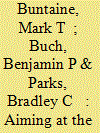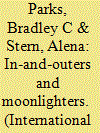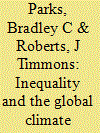|
|
|
Sort Order |
|
|
|
Items / Page
|
|
|
|
|
|
|
| Srl | Item |
| 1 |
ID:
155502


|
|
|
|
|
| Summary/Abstract |
We explain why international development organizations have had so little success building and reforming public sector institutions in developing countries. They often fail despite their apparently strong commitment to achieving measurable results and extraordinary amounts of time, money, and effort. We demonstrate that, when donors and lenders make access to financing contingent upon achievement of performance targets, recipient countries tend to choose easy and shallow institutional targets. These targets measure the organization of public sector institutions, rather than their effectiveness at addressing public problems. Such targets provide countries with low-cost opportunities to signal commitment to institution-building to international development organizations. We demonstrate the explanatory and predictive power of our argument in the context of a sector of World Bank lending—environment and natural resource management—that focuses heavily on improving public sector institutions.
|
|
|
|
|
|
|
|
|
|
|
|
|
|
|
|
| 2 |
ID:
130924


|
|
|
|
|
| Publication |
2014.
|
| Summary/Abstract |
Some international relations (IR) scholars lament the divide that exists between the academic community and the policy community. Others celebrate it. In this article, we test a core proposition advanced by advocates of bridging the policy-academy divide: that direct engagement in the policy-making process will make international relations scholars more adept at designing, undertaking, and communicating research in ways that are useful and relevant to policymakers. Using a difference-in-differences estimation strategy, we evaluate whether and to what extent direct exposure to the policy-making process influences how IR scholars select publication outlets. We define and evaluate policy-making exposure in two ways: periods of public service in which faculty members temporarily vacate their university positions to work for governments or intergovernmental organizations; and instances in which faculty members undertake substantial consulting assignments for government agencies and intergovernmental organizations. Our findings suggest that "in-and-outers"-faculty members who temporarily leave the ivory tower to accept policy positions-return to the academy with new perspectives and publication priorities. By contrast, we find no policy-making exposure effect among "moonlighters." Our results suggest that IR scholars are no more likely to publish in policy journals after doing part-time consulting work for governments and IOs.
|
|
|
|
|
|
|
|
|
|
|
|
|
|
|
|
| 3 |
ID:
085440


|
|
|
|
|
| Publication |
2008.
|
| Summary/Abstract |
This article explores the hypothesis that global inequality may be a central impediment to interstate cooperation on climate change policy. Conventional wisdom suggests that outcomes in international environmental politics are primarily attributable to material self-interest, bargaining power, coercion, domestic environmental values, exogenous shocks and crises, the existence of salient policy solutions, the strength of political leadership and the influence of nonstate actors. Yet none of these approaches offers a completely satisfactory explanation for the long-standing north-south divide on climate change. Drawing on social inequality literature and international relations theory, we argue that inequality dampens cooperative efforts by reinforcing 'structuralist' world-views and causal beliefs, polarizing policy preferences, promoting particularistic notions of fairness, generating divergent and unstable expectations about future behaviour, eroding conditions of mutual trust and creating incentives for zero-sum and negative-sum behaviour. In effect, inequality undermines the establishment of mutually acceptable 'rules of the game' which could mitigate these obstacles.
|
|
|
|
|
|
|
|
|
|
|
|
|
|
|
|
|
|
|
|
|